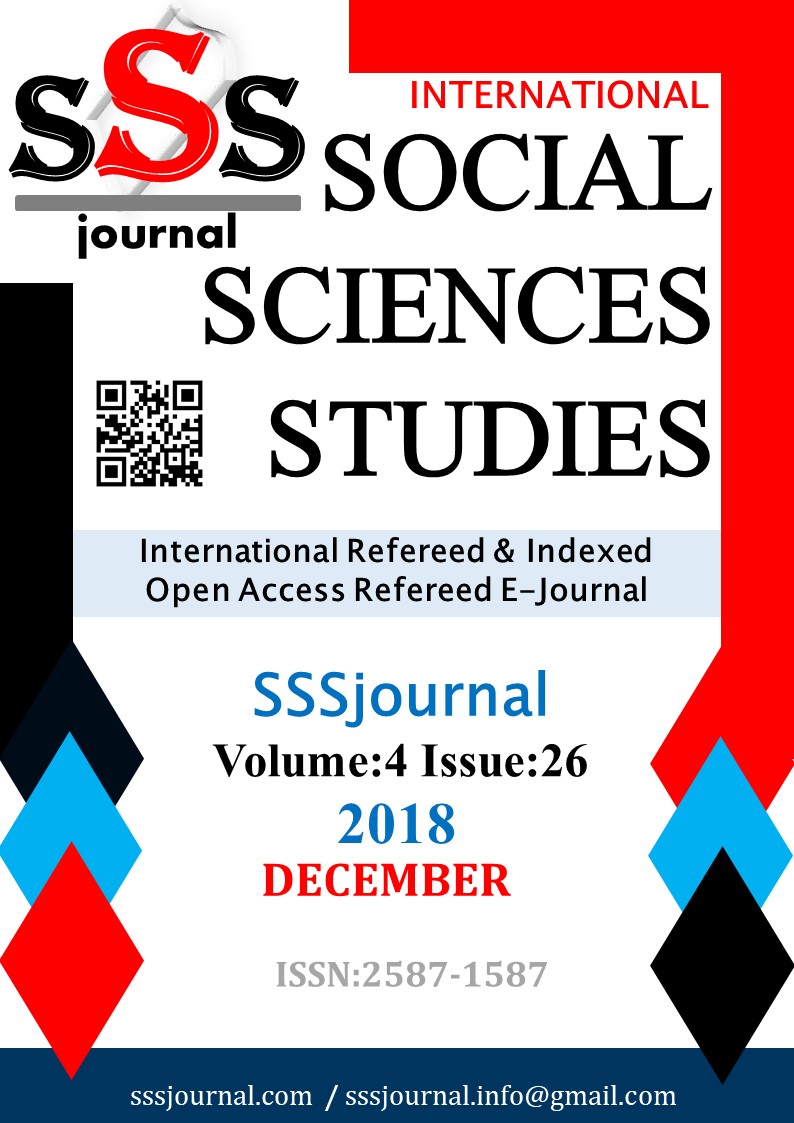AHLAKİ YARGI TESTİ KULLANILARAK YAPILAN LİSANSÜSTÜ ÇALIŞMALARIN ÇEŞİTLİ DEĞİŞKENLER AÇISINDAN KARŞILAŞTIRILMASI
Author :
Abstract
Zihin temelli ahlak gelişim kuramlarında, ahlaki yargıyı ölçmek için kullanılan en yaygın iki test James R. Rest tarafından geliştirilen DIT (Defining Issues Test) ve George Lind tarafından geliştirilen MUT (Moralisches Urteil Test) testidir. Bu testler kullanılarak dünya çapında çokça araştırma yapılmış; ülkemizde de yüksek lisans ve doktora seviyesinde çeşitli çalışmalarda kullanılmıştır. Bu araştırmalarda cinsiyet, yaş, sosyo-ekonomik durum, yaşanılan çevre, anne-baba eğitim durumu gibi kriterler bağımsız değişken olarak kullanılmış ve bu değişkenlerin ahlaki yargı ile ilişkisi incelenmiştir. Biz de çalışmamızda ülkemizde DIT ve MUT ölçeği kullanılarak yapılan 12 lisansüstü tez çalışmasının bulgularından hareketle, söz konusu değişkenlerden hangisinin ahlaki yargı üzerinde etkisinin daha fazla olduğunu tespit etmek amacındayız. Araştırma, amacın, önemin, sınırlılıkların ve yöntemin açıklandığı giriş bölümü; ahlaki yargı ve ahlaki gelişim kavramlarının ele alındığı ve incelenecek olan lisansüstü çalışmaların tanıtıldığı kavramsal çerçeve bölümü; bu çalışmaların bağımsız değişkenlerinin ahlaki yargı ile ilişkisinin incelendiği bulgular ve yorum bölümü olmak üzere üç bölümden oluşmaktadır. En son kısımda ise araştırma bulgularının özetlendiği ve bir takım önerilere yer verildiği sonuç ve öneriler bölümü bulunmaktadır.
Keywords
Abstract
In the mind-based moral development theories, the two most common tests used to measure moral judgment are DIT (Defining Issues Test) developed by James Rest and MUT (Moralisches Urteil Test) developed by George Lind. A lot of research has been done around the world using these tests; ın our country, it has been used in various studies at master and doctorate level. In these studies, criteria such as gender, age, socio-economic status, living environment, education of parents were used as independent variables and the relationship between these variables and moral judgment is examined. In this study, we aimed to determine which of these variables has more effect on moral judgment based on the findings of 12 postgraduate thesis studies conducted in Turkey using DIT and MUT scale. The research consists of an introductory section where the purpose, importance, limitations and method are explained; the conceptual framework section where the concepts are discussed and the postgraduate studies which to be examined are introduced; findings and commentary section where the relationship between moral judgment and the independent variables of these studies. In the last part, there is a section of conclusions and recommendations where the research findings are summarized and some suggestions are given.
Keywords
- Aydın, M. (2007). “İslam Bağlamında Ahlak” (Ed. Recep Kaymakcan-Mevlüt Uyanık), Teorik ve Pratik
- Aydın, M. (2007). “İslam Bağlamında Ahlak” (Ed. Recep Kaymakcan-Mevlüt Uyanık), Teorik ve Pratik Yönleriyle Ahlak, ss. 69-93, DEM Yayınları, İstanbul.
- Clouse, B. (2000). “Ergen Ahlâk Gelişimi ve Cinselliği” (Çev. Turgay Gündüz), Uludağ Üniversitesi İlahiyat Fakültesi Dergisi, 9(9): 715-754.
- Çağlayan, A. (2013). Ahlak Pusulası Ahlak ve Değerler Eğitimi, Dem Yayınları, İstanbul.
- Çağrıcı, M. (2003). “Ahlak”, Türkiye Diyanet Vakfı İslam Ansiklopedisi (DİA), (2):1-9, İstanbul.
- Çırak, G. (2006). “Üniversite Öğrencilerinin Ahlaki Yargı Yetenekleri ve Ahlaki Yargı Yetenekleri ileKendini Gerçekleştirme Düzeylerinin Karşılaştırılması”, Yüksek Lisans Tezi, Çukurova Üniversitesi Eğitim Bilimleri Enstitüsü, Adana.
- Çiftçi, M. (2008). “Disiplin Cezası Alan ve Almayan Lise Öğrencilerinin Ahlaki Yargı Yetenekleri, BilişselÇarpıtmaları ve Empatik Becerilerinin Karşılaştırılması”, Doktora Tezi, Atatürk Üniversitesi Sosyal BilimlerGölcük, S. (2010). “İlköğretim İkinci Kademe Öğrencilerinde Din Kültürü ve Ahlâk Bilgisi Düzeyi ileAhlaki Gelişim Arasındaki İlişkiler”, Yüksek Lisans Tezi, Dokuz Eylül Üniversitesi Sosyal Bilimler Enstitüsü, İzmir.
- Görgün, T. (2010). “İslam ve Ahlak” (Ed. Tahsin Görgün), Anadolu Üniversitesi İlahiyat Önlisans Programı İslam Ahlak Esasları, ss. 2-21, Eskişehir.
- Güler, E. D. (2006). “Ortaöğretim Kurumlarında Beden Eğitimi Dersinin Çocuğun Ahlak Gelişimine Etkisi”, Yüksek Lisans Tezi, Selçuk Üniversitesi Sağlık Bilimleri Enstitüsü, Konya.
- Gültekin, F. (2008). “Psikoloji, Rehberlik ve Psikolojik Danışma, Sosyal Hizmet Öğrencilerinde ÜniversiteEğitiminin Ahlaki Yargı Yeteneğine Etkisi”, Yüksek Lisans Tezi, Ankara Üniversitesi Sağlık Bilimleri Enstitüsü, Ankara.
- Gümüş, E. (2015). “Kohlberg'in Ahlaki Gelişim Kuramına Göre Ortaokul Öğrencilerinin Ahlaki GelişimDüzeyi ile Cinsiyet Rollerinin İncelenmesi”, Yüksek Lisans Tezi, Atatürk Üniversitesi Eğitim Bilimleri Güngör, E. Ahlak Psikolojisi ve Sosyal Ahlak, Ötüken Neşriyat, İstanbul.
- İz, F. B. (2011). “Kohlberg’in Bilişsel Ahlak Gelişimi Kuramına Göre Hemşire Öğrencilerin Ahlaki YargıYeteneklerinin Belirlenmesi”, Doktora Tezi, Dokuz Eylül Üniversitesi Sağlık Bilimleri Enstitüsü, İzmir.
- Kangal, S. B. (2010). “Normal ve Üstün Yetenekli Çocukların Ahlaki Yargılarının Karşılaştırılması veYaratıcı Drama Programının Ahlaki Yargılarına Etkisi”, Doktora Tezi, Hacettepe Üniversitesi Sağlık Bilimleri Enstitüsü, Ankara.
- Kasapoğlu, A. (2006). “Gelişim Psikolojisi Açısından Kur’an’da “Bülûğ” Olgusu”, Cumhuriyet Üniversitesi İlahiyat Fakültesi Dergisi, 10 (2): 269-291.
- Kaya, M. (1993). “Bazı Kişisel Değişkenlere Göre Üniversite Öğrencilerinin Ahlaki Yargıları”, Doktora Tezi, Ondokuz Mayıs Üniversitesi Sosyal Bilimler Enstitüsü, Samsun.
- ------------ (1997). “Kişilik Özelliklerinin Ahlâkî Yargı Üzerindeki Etkisi”, Din Eğitimi Araştırmaları Dergisi, 4: 185-200.
- Kılıç, A. İ. (2009). “Yüz Temel Eserde Dini ve Ahlaki Değerler”, Yüksek Lisans Tezi, Ondokuz Mayıs Üniversitesi Sosyal Bilimler Enstitüsü, Samsun.
- Köylü, M. (2003). “Çocukluk Dönemi Ahlak Gelişimi”, Din Eğitimi Araştırmaları Dergisi, 12: 69-87. ------------- (2010). Dünya Dinlerinde Ahlak, DEM Yayınları, İstanbul.
- Sakin, A. (2007). “Okul Öncesi Öğretmenlerin Mesleki Etik Davranışlar Hakkındaki Görüşleri ile AhlakiYargı Düzeyleri ve Öğretmenlik Tutumlarının İncelenmesi”, Doktora Tezi, Marmara Üniversitesi Eğitim Bilimleri Enstitüsü, İstanbul.
- Seydooğulları, S. Ü. (2008). “Demokratik ve Otoriter Ana Baba Tutumlarının Lisede Öğrenim GörenÖğrencilerin Ahlaki Yargı Yeteneğine Etkisi”, Yüksek Lisans Tezi, Sakarya Üniversitesi Sosyal Bilimler Enstitüsü, Sakarya.
- Soykan, Ö. N. (2007). “Genel Geçer Bir Ahlak Olanaklı mıdır?”, Uluslararası Değerler ve Eğitimi Sempozyumu, 2004, (Ed. R. Kaymakcan vd. ), DEM, 45-53, İstanbul.
- Şafak, Z. (2008) “İlköğretim Okullarında Çalışan Öğretmenler ve Yöneticilerin Bilişsel Ahlaki YargıYeteneklerinin Çok Boyutlu Olarak İncelenmesi (İstanbul Anadolu Yakası Örneği)”, Yüksek Lisans Tezi, Yeditepe Üniversitesi, Sosyal Bilimler Enstitüsü, İstanbul.
- Turan, İ. (2010). “Bazı Batı ve Türk Çocuk Klasiklerinde Dini ve Ahlaki Değerler”, Din Bilimleri Akademik Araştırma Dergisi, 10(1): 171-194.
- Uysal, E. (2014). “Değerler Üzerine Bazı Düşünceler ve Bir Erdem Tasnifi Denemesi: İnsani Erdemler- İslami Erdemler”, Uludağ Üniversitesi İlahiyat Fakültesi Dergisi, 12(1): 51-69.
- Yıldız, S. A. (2012). “Ahlak Gelişimi” (Ed. Hatice Ergin-Armağan Yıldız), Gelişim Psikolojisi, ss. 209-231, Nobel Yayıncılık, Ankara.





